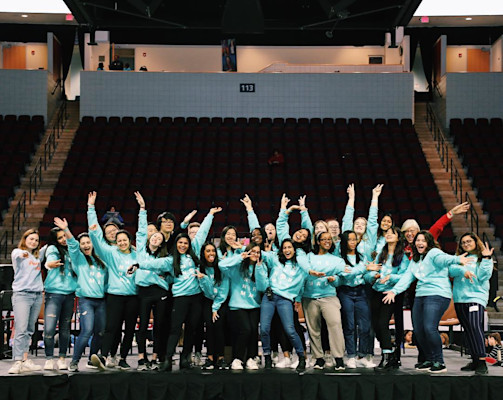Fiona Whittington, 24

From 2017 to 2022, the gender diversity of the hackathon community increased from 18% to 46%, proof that hackers of underrepresented genders are continually making space for themselves in the world of tech. One of the central figures behind this shift is Fiona Whittington.
Fiona grew up building websites and writing basic programs, but found most of her coding projects stale and solitary. Her introduction to hackathons changed everything. HackNYU 2017, her first hackathon experience, was a 200-mile solo expedition from home. While this event propelled her into the hacking world, and she enjoyed the experience overall, it wasn’t all positive. She noticed a glaring gender disparity, and another coder even questioned her skills because she was a woman. Instead of discouraging her, this event lit a fire in her that continues today. Her mission? To create a hacking space where people of all gender identities can feel comfortable, supported, and ready to thrive.
After her first year at Boston University, Fiona felt disoriented and unsure of her path. In her sophomore year, she joined the hacker community and started attending hackathons regularly, and realized she had found her place. She credits the BU hackathon organizers with giving her life focus. She says, “No matter what time it was or what I was going through, these organizers were there for me. I don’t think I would have gotten through college without them, and I definitely wouldn’t be where I am today without their support through all the ups and downs.”
Fiona’s passion, dedication, and moral commitment led her to create TechTogether, an organization aiming to increase the representation of people of marginalized genders in hackathons. The hacker community inspired her and carried her through challenging periods, and she wanted to provide the same support to hackers everywhere. Her first step was to organize SheHacks Boston, a direct response to her experience at HackNYU2017.
Through TechTogether, Fiona has created a platform for underrepresented hackers. TechTogether’s mission includes serving people of “all gender identities which have been systematically oppressed by those in power throughout history.” She points out that her pathway was unconventional, and she does not fit the typical mold of a hacker. She says, “I’m a female, [...] queer, not a computer science student, not even pursuing a career in tech!” None of these are deficits, and she knows it. She is proud to “redefine the stereotype” through her organization’s work.
TechTogether’s impact benefits those that need it most. As she says, “I believe we’ve been able to start so many important conversations about diversity beyond gender that have had a long-lasting impact on the hackathon community. I’m especially proud of our work that has resulted in cultivating safer spaces for LGBTQ+ hackers in our community, and in others.”
TechTogether and Major League Hacking (MLH) intertwine in many ways (now more than ever, as MLH recently acquired TechTogether), and Fiona understands the importance of that bond. MLH supports so many hackathons with resources, guidance, and expertise, and she is grateful. More than logistical support, she knows that TechTogether and MLH both share “strong values and a community-centric approach.”
Fiona responds to inequality with action, and her work has had a lasting effect. As she says, “TechTogether has changed so many people’s lives, and if it ended today—our impact would live on for years to come.”
Quick Facts

Fiona Whittington, 24

From 2017 to 2022, the gender diversity of the hackathon community increased from 18% to 46%, proof that hackers of underrepresented genders are continually making space for themselves in the world of tech. One of the central figures behind this shift is Fiona Whittington.
Fiona grew up building websites and writing basic programs, but found most of her coding projects stale and solitary. Her introduction to hackathons changed everything. HackNYU 2017, her first hackathon experience, was a 200-mile solo expedition from home. While this event propelled her into the hacking world, and she enjoyed the experience overall, it wasn’t all positive. She noticed a glaring gender disparity, and another coder even questioned her skills because she was a woman. Instead of discouraging her, this event lit a fire in her that continues today. Her mission? To create a hacking space where people of all gender identities can feel comfortable, supported, and ready to thrive.
After her first year at Boston University, Fiona felt disoriented and unsure of her path. In her sophomore year, she joined the hacker community and started attending hackathons regularly, and realized she had found her place. She credits the BU hackathon organizers with giving her life focus. She says, “No matter what time it was or what I was going through, these organizers were there for me. I don’t think I would have gotten through college without them, and I definitely wouldn’t be where I am today without their support through all the ups and downs.”
Fiona’s passion, dedication, and moral commitment led her to create TechTogether, an organization aiming to increase the representation of people of marginalized genders in hackathons. The hacker community inspired her and carried her through challenging periods, and she wanted to provide the same support to hackers everywhere. Her first step was to organize SheHacks Boston, a direct response to her experience at HackNYU2017.
Through TechTogether, Fiona has created a platform for underrepresented hackers. TechTogether’s mission includes serving people of “all gender identities which have been systematically oppressed by those in power throughout history.” She points out that her pathway was unconventional, and she does not fit the typical mold of a hacker. She says, “I’m a female, [...] queer, not a computer science student, not even pursuing a career in tech!” None of these are deficits, and she knows it. She is proud to “redefine the stereotype” through her organization’s work.
TechTogether’s impact benefits those that need it most. As she says, “I believe we’ve been able to start so many important conversations about diversity beyond gender that have had a long-lasting impact on the hackathon community. I’m especially proud of our work that has resulted in cultivating safer spaces for LGBTQ+ hackers in our community, and in others.”
TechTogether and Major League Hacking (MLH) intertwine in many ways (now more than ever, as MLH recently acquired TechTogether), and Fiona understands the importance of that bond. MLH supports so many hackathons with resources, guidance, and expertise, and she is grateful. More than logistical support, she knows that TechTogether and MLH both share “strong values and a community-centric approach.”
Fiona responds to inequality with action, and her work has had a lasting effect. As she says, “TechTogether has changed so many people’s lives, and if it ended today—our impact would live on for years to come.”
Quick Facts




